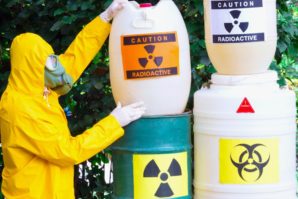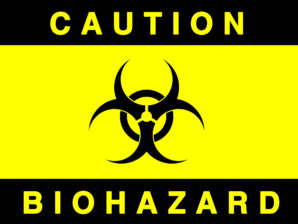

Courtesy of LinkedIn
Hazardous waste is waste that poses substantial or potential threats to the public’s health or the environment. By definition, these materials can be harmful and should never go into your community’s regular trash. Proper waste disposal is critical due to the fact that certain types of wastes can be dangerous and can contaminate if not handled properly. Hazardous waste also has the potential to cause diseases or get into our water system poisoning anyone who drinks from it. Although there are rules and regulations in place to ensure our safety, it’s still important for individuals to know the difference between certain hazardous materials.
For example, toxic pollution is a major threat in largely populated communities, where millions of people are routinely exposed to high levels of toxins. This can include things like lead, mercury, hexavalent chromium, radionuclides, and arsenic, among other things. Hazardous waste, on the other hand, can be liquids, solids, gasses, or sludges. They also include commercial products, such as different cleaning products or pesticides.
“How does hazardous waste affect our planet?” you ask.
Be on the Lookout
To begin with, over a period of time, hazardous waste has already poisoned our oceans, lakes, and rivers. Each year, thousands of fish, whales, and other aquatic animals was up on shore filled with enough trash and toxins to kill a human being several times. In other words, hazardous waste is poisonous to life forms and affects the environment by destroying plants and animals, interrupting their growth cycles which could lead to extinction. Hazardous waste is especially dangerous for young children, altering their physical features.
If a fetus, for instance, is in a developing stage, the introduction of chemicals interferes with biological information, resulting in malfunctioning organs and limbs. The ultimate result being death. Typically, the presence of hazardous waste in the environment is often full of inadequate disposal (by humans). Before tossing something in the trash, ask yourself, what can I put in a dumpster? You will soon be able to determine whether or not the object you’re holding belongs in the dumpster.
Improperly maintained landfills are a major issue. The most compelling evidence, however, is although these dangerous chemicals seem isolated from people and communities, they can still containment the surrounding environment.
Understand How to Properly Dispose of Waste
- Be responsible with your waste
- Research your local laws
- Recognize everyday hazardous products
- Take advantage home pickup service

Courtesy of Return of King
As noted earlier, ‘toxic’ is usually a word generated with something that contains harmful or poisonous substance. Things that are labeled toxic can lead to serious illness, debilitation, or even death. The word, however, can take on different meanings. Which is why it’s important for us to know the difference depending on the context. For example, the liquid bottle is toxic, so you shouldn’t touch it. Another example of toxic, can often be used in medical terminology. For instance: The patient was toxic from the infection, they were exposed to. In this case, a toxic person is an expression used to describe someone that purposely hurts or damages another individual.
Examples of toxic waste:
- Motor oil, oil filters, brake fluid
- Used antifreeze
- Pool chemicals
- Household batteries or car batteries
- CRTs, old TVs, and other electronics
- Cleaners with acid or lye
The proper handling of toxic waste — whether in the form of reuse, recycling or safe disposal helps prevent accidental environmental contamination, while at the same time, reducing our dependence on raw materials. Toxins found in pool chemicals can cause dry skin, rashes, chemical burns, and ulcerations.
Tips for Reducing Toxic Waste:
- Use water-based materials such as latex paint
- Try using non-toxic alternatives to conventional household cleaners whenever possible.
- Never pour toxic materials or other hazardous liquids into a storm drain. Instead, take household waste to household drop-off locations.
Assistance should be available in your neighborhood for advice on how to inventory, catalog, collect, containerize and dispose of hazardous waste. Try looking first on the internet, or in a telephone book for the State Department of Health Service or equivalent. Waste management companies and haulers must be registered with the state and with the Environmental Protection Agency (EPA).
———
Thanks for reading my article. I’m curious to know, however, what are some other ways we can properly dispose of hazardous waste and materials? Feel free to comment on today’s article.
References:
- https://en.wikipedia.org/wiki/Waste
- http://www.wm.com/enterprise/municipalities/residential-solutions/household-hazardous-waste.jsp
- http://www.equipmentrentalpros.com/resources/what-can-i-dispose-of-in-a-dumpster.php#navbar-header
- http://www.returnofkings.com/35881/4-signs-youre-in-a-poisonous-ltr
- http://articles.bluehaven.com/pool-chlorine-why-and-how-it-harms-skin-and-what-you-can-do-about-it
- http://cool.conservation-us.org/waac/wn/wn06/wn06-2/wn06-205.html
- http://blog.idrenvironmental.com/how-hazardous-waste-disposal-affects-the-environment
